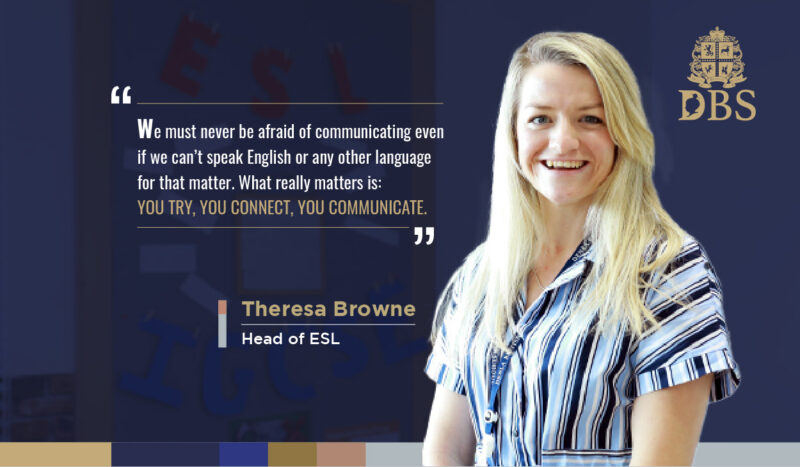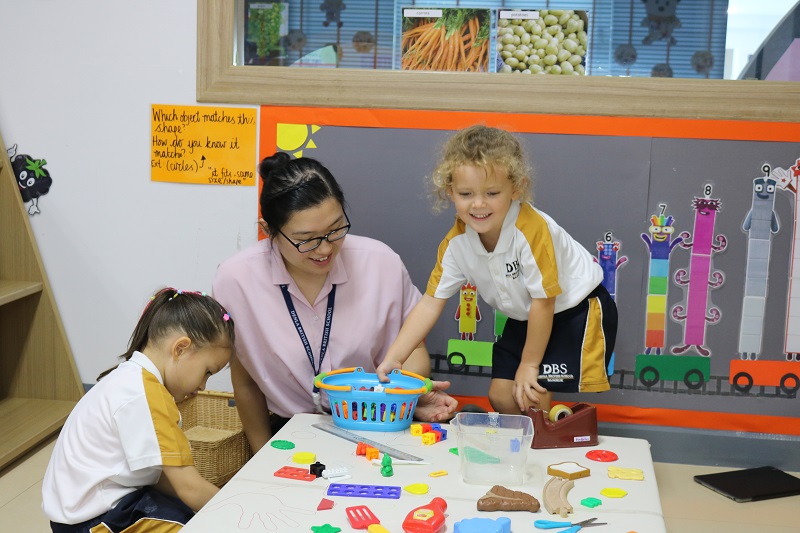
- ABOUT US
- SCHOOL LIFE
- ADMISSIONS
- CALENDAR
- CONTACT US
- PARENT
- EVENTS
As a native English speaker from South Africa, I am often asked: do you speak African?
The short answer is no, I don’t speak African because Africa is a continent made up of many different countries, 54 to be exact. It may surprise you to know that Africa has upward of 2,000 languages which are spoken.

I do understand the question: “Do you speak African?”
I do speak three of the official languages of Southern Africa. Namely Zulu, Afrikaans and English. I can read and write the last two. When we moved to Malaysia in 2014 I made it my goal to speak Malay. I achieved this goal and I subsequently learned to read basic Malay too.
Languages are diverse and some are downright difficult. I am currently learning how to speak Thai. I have learned the Thai alphabet and I am able to read Thai words albeit like a kindergarten child. This hasn’t stopped me from attempting to speak or read Thai in front of other people. The big difference here is that: I try.

Many times in the last six months of being in Thailand I have had several people say to me: “Oh, my English is not very good.” To which I respond: “Pasaa Thai kong chan mai dee.”
The best thing I can do is try in this type of situation.
Even if people don’t speak any English whatsoever it has never stopped me from having a conversation. Once when we went travelling in Japan we met some lovely Japanese people at a restaurant. They seemed interested in talking to us. So the interested party pulled out his smartphone and put Google translate on conversation mode. He asked us a question in Japanese and Google immediately translated it into English. We spent a good part of two hours having a conversation using Google. We learned so much about one another and about each of our cultures and lives that night. It made me realise we must never be afraid of communicating even if we can’t speak English or any other language for that matter. What really matters is: YOU TRY, YOU CONNECT, YOU COMMUNICATE.

Language should not frighten you or stop you. If you think of it like this: Languages are merely a few sounds put together to make some sort of sense. The moment I realised languages were just sounds, it made it all the easier to understand.
One thing that we need to remove from our vocabulary is: “Oh, my English/Mandarin/Japanese is not very good.” We can all speak other languages the most important thing is taking the first step.

My hope for all of our students at DBS is that they try to speak, read and write other languages even if at first they are not very good. I guess this is why I have a huge passion for EAL teaching.
“If you never try, then you’ll never know.”
“เราต้องไม่กลัวที่จะสื่อสาร แม้ว่าเราจะไม่สามารถพูดภาษาอังกฤษ หรือว่าพูดภาษาอื่น ๆ ก็ตาม สิ่งสำคัญคือ เราพยายาม เราสร้างความสัมพันธ์ และเราสื่อสารกัน”
ในฐานะที่ฉันมาจากประเทศแอฟริกาใต้และพูดภาษาอังกฤษเป็นภาษาแม่ ผู้คนมักชอบถามฉันว่า “คุณพูดภาษาแอฟริกันไหม?” ฉันตอบพวกเขาสั้น ๆ ไปว่า “ไม่ ฉันไม่พูดภาษาแอฟริกัน” เพราะแอฟริกาเป็นทวีปที่ประกอบไปด้วยประเทศมากถึง 54 ประเทศ และคนที่นี่ก็มีภาษาไว้ใช้สื่อสารกันมากกว่า 2,000 ภาษา

แต่ฉันก็เข้าใจพวกเขานะที่ถามฉันว่า “คุณพูดภาษาแอฟริกันไหม?”
ฉันสามารถพูดภาษาราชการของแอฟริกาใต้ได้ถึง 3 ภาษา คือภาษาซูลู ภาษาอาฟรีกานส์ และภาษาอังกฤษ โดยที่ฉันสามารถอ่านและเขียนภาษาอาฟรีกานส์และอังกฤษได้ ส่วนเมื่อปี 2557 ที่ฉันย้ายมาอยู่ที่ประเทศมาเลเซีย ฉันก็ตั้งเป้าหมายไว้ว่าฉันจะต้องพูดภาษามลายูให้ได้ ซึ่งฉันก็สามารถพูดได้อย่างที่ตั้งเป้าไว้และในเวลาต่อมาฉันก็อ่านภาษามลายูในระดับพื้นฐานได้อีกด้วย
ภาษานั้นมีความหลากหลายและภาษาบางภาษาก็ยากมากด้วย ในตอนนี้ฉันกำลังเรียนพูดภาษาไทยอยู่ โดยฉันได้เรียนอักษรไทยและตอนนี้ก็สามารถอ่านภาษาไทยได้แล้วด้วย ถึงแม้ว่าจะสามารถอ่านภาษาไทยได้ในระดับเด็กอนุบาลเท่านั้นก็ตาม แต่นั่นก็ไม่ได้หยุดความพยายามของฉันในการพูดและอ่านภาษาไทยต่อหน้าคนอื่น ๆ เลย เพราะสิ่งที่ฉันกำลังทำอยู่ซึ่งสร้างความแตกต่างได้อย่างยิ่ง คือ ความพยายามของฉัน

หลายครั้งในช่วง 6 เดือนที่ผ่านมาที่ฉันอยู่ที่ประเทศไทย หลายคนได้เข้ามาพูดกับฉันว่า “โอ้ ภาษาอังกฤษของพวกเขานั้นไม่ค่อยดีเลย” ซึ่งฉันก็ตอบกลับเป็นภาษาไทยไปว่า “ภาษาไทยของฉันไม่ดี” ซึ่งสิ่งที่ฉันสามารถทำได้ในตอนนั้นก็คือต้องพยายามเท่านั้น
แม้ว่าจะไม่มีใครพูดภาษาอังกฤษกับฉันเลย แต่ฉันก็ไม่เคยหยุดพูดคุยกับพวกเขา มีครั้งหนึ่งที่ฉันและครอบครัวเดินทางไปญี่ปุ่น และเราก็พบกับคู่รักชาวญี่ปุ่นคู่หนึ่งที่ร้านอาหาร ชาวญี่ปุ่นสองคนนั้นอยากคุยกับพวกเราถึงขั้นที่เขาต้องหยิบโทรศัพท์ออกมา เปิดใช้ Google Translate ในโหมดการสนทนา คนญี่ปุ่นคนนั้นถามพวกเราเป็นภาษาญี่ปุ่นและให้ Google แปลออกมาเป็นภาษาอังกฤษในทันที จากนั้นพวกเราก็ได้พูดคุยกันนานถึง 2 ชั่วโมงโดยใช้ Google เป็นตัวกลางของการสนทนา เราได้เรียนรู้อะไรหลาย ๆ อย่างจากวัฒนธรรมที่แตกต่างกันของพวกเรา และเราก็สนุกสนานไปกับค่ำคืนนั้นอย่างยิ่ง เหตุการณ์ครั้งนั้นทำให้ฉันยิ่งตระหนักว่า เราต้องไม่กลัวที่จะสื่อสาร แม้ว่าเราจะไม่สามารถพูดภาษาอังกฤษ หรือว่าพูดภาษาอื่น ๆ ก็ตาม สิ่งสำคัญคือ เราพยายาม เราสร้างความสัมพันธ์ และเราสื่อสารกัน

ภาษาไม่ควรจะเป็นสิ่งที่ทำให้คุณหวาดกลัวหรือขัดขวางคุณ ลองปรับความคิด โดยมองว่าภาษาก็เป็นเพียงแค่เสียงที่เราเอามารวมกันจนเกิดเป็นความเข้าใจดูสิ เมื่อคิดได้อย่างนี้ คุณก็จะเข้าใจภาษาได้ง่ายมากขึ้น
คุณต้องตัดความคิดของตัวเองที่มักชอบพูดว่า “โอ้ ภาษาอังกฤษ หรือจีน หรือญี่ปุ่น ของฉันนั้นไม่ดีเลย” ออกไปเสีย เพราะความจริงแล้วทุกคนสามารถพูดภาษาอื่น ๆ ได้ เพียงแค่เราเริ่มที่จะพูดมันเท่านั้นเอง

สำหรับฉัน ฉันหวังให้นักเรียนของฉันที่โรงเรียนนานาชาติ DBS ได้พยายามพูด อ่าน และเขียนภาษาอื่น ๆ แม้ว่าพวกเขาอาจจะไม่สามารถทำมันได้ดีในครั้งแรกก็ตาม ซึ่งนี่ก็คือเหตุผลที่ทำให้ฉันรักในการสอนภาษาอังกฤษเป็นภาษาที่สองอย่างมาก
“หากคุณไม่พยายาม คุณก็จะไม่รู้”